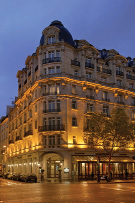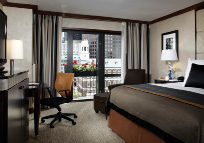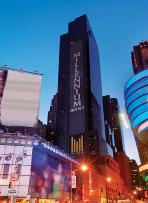- Home
- Media Kit
- Current Issue
- Past Issues
- Ad Specs-Submission
- Ad Print Settings
- Reprints (PDF)
- Photo Specifications (PDF)
- Contact Us

![]()
ONLINE

Editors' Note
Richard Hartman joined the Board of Millennium & Copthorne Hotels plc in May 2008. From 1999, he has held senior positions at InterContinental Hotels Group (formerly known as Six Continents Hotels Group and Bass Hotels & Resorts) where he was a main board director from 2003 until 2007, most recently as Managing Director of InterContinental Hotels Group, Europe, Middle East, and Africa with responsibility for over 600 hotels. Before this, he was Managing Director of InterContinental Hotels Group Asia Pacific between 1998 and 2003. Prior to joining InterContinental Hotels Group in 1998, he was President of ITT Sheraton North America between 1993 and 1998, and President of ITT Sheraton Asia-Pacific between 1985 and 1992.
Company Brief
Millennium & Copthorne Hotels plc (www.millenniumhotels.com) is a global hotel company which owns, asset manages, and/or operates over 120 hotels in 19 countries around the world. Millennium Hotels and Resorts was established as a global brand by Millennium & Copthorne Hotels plc and comprises three distinct brands: Millennium Hotels, Copthorne Hotels, and Kingsgate Hotels and Resorts. Additionally, a new tier, Grand Millennium Hotels, represents the highest levels of service and facilities aimed at the international traveler, while Millennium Suites brings the serviced apartment product into the group.
We are continually looking at opportunities in areas where the location will be accretive to the brand strategically. We are not in the brand and distribution business – it is not our goal to have 1,000, 500, or even 300 hotels. Since we own most of our hotels, we are very much interested in the location of our hotels, because in our company, the brand does not drive the distribution opportunities; it’s the distribution opportunities that drive the brand. So you won’t see us building a new Millennium hotel in Milwaukee, Wisconsin or Ogden, Utah because we don’t have the brand strength to deliver the customers to places like that. A good location would be San Francisco, because we’re very strong in Asia, and San Francisco is the U.S. point of entry for Asians. We could also have a hotel in Washington, D.C. considering our presence in the capital cities in Asia. And with 31 hotels in New Zealand, we would probably greatly benefit from hotels in Sydney, Melbourne, and Brisbane.
So I’m looking at that sort of expansion rather than just adding flags to the map to attract more fees, because with us, flags on the map attract more investment.
I think you’re also going to see some rationalization of our existing assets, because we do have assets in locations that are not accretive to the long-term health of the business.

Millennium Paris Opera
Fitness centers are pretty much a requirement now, and most people who have the time do use a gym.
As far as a full-blown spa, I’m not a big fan of the way some of them have been built lately. They serve a use in some places, but in general, you have to look at the spa business as a completely stand-alone business and not necessarily as an amenity for the hotel, because it’s too much of a commitment of time, money, and expertise to be looked at that way.

Millennium Bostonian bedroom
I don’t. The generation that is going to run the world in the next 15 years is going to do everything on the Internet. Last November in the U.K., in terms of total volume of expenditure in advertising, online advertising surpassed television advertising. Everyone is figuring out that the best place to get your customers is on the Internet – not via TV, radio, or newspapers anymore, and to the dismay of many hoteliers, also not through people walking around the streets leaving brochures on people’s desks. Pricing, shopping, and becoming intimate with the product is all readily available on the Internet. The only thing people seem slightly reluctant to do is commit themselves to a booking or a purchase online. For that, people still would prefer to talk to a person or use a telephone.
The hotel industry is sort of stuck between the two. If you’re a Ritz or a Four Seasons customer and you have a choice of sticking your American Express card in a kiosk to get your key, or standing in line for 10 minutes because a train or plane just arrived, maybe my generation would stand in line but I can guarantee you my kids won’t.

Millennium Broadway Hotel
This is a business where everything happens in the hotels that you own or operate, and in order to ensure that things are going right, you can do two things: you can smother the organization with policies and procedures, and hire a bunch of auditors and mystery shoppers to make sure those policies and procedures are being followed; or you can get the right people, tell them what the goals are, and let them get on with it. The latter is a lot easier and cheaper to do than the former, but both require a lot of staff. The most important thing I and our senior people can do is to make sure we have the right people in the hotels, and that starts with the general manager. Like anything else, the personality of the property is a reflection of the personality of the general manager.
I don’t very often. I’ve done this for a long time, and it is a lifestyle business. You can’t sleep in a bank, but you can sleep in my business, and drink and eat. You sort of live the business.•